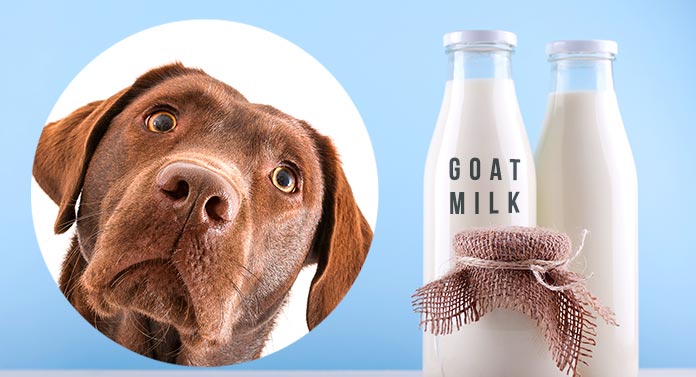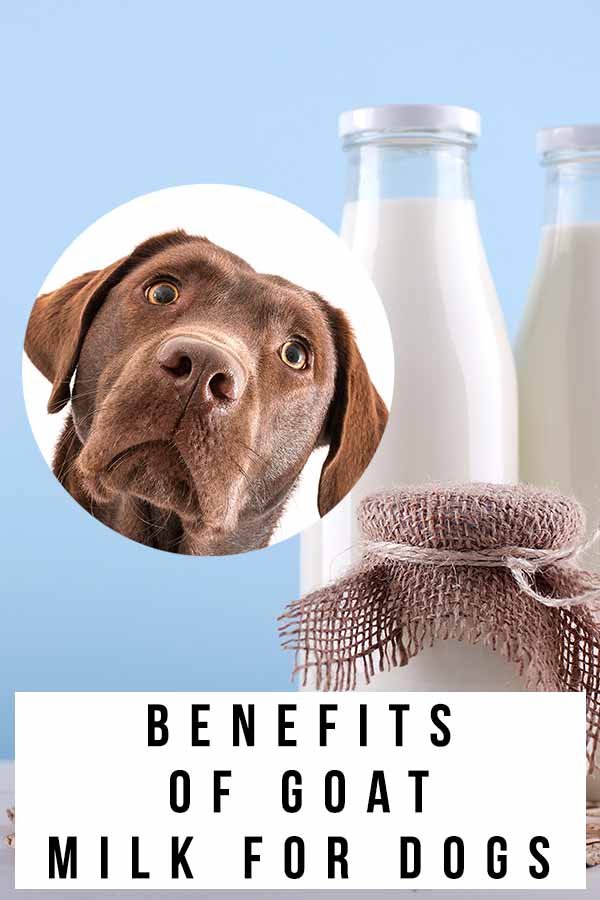
Lots of dog owners are interested in the benefits of goat milk for dogs.
Goat’s milk is a safe addition to most dogs’ diets, and it may confer some health benefits on them.
But, some dogs may react badly to goat milk, so it’s important to introduce it carefully.
Can Dogs Drink Goat Milk?
Goats were one of the first animals to be kept by humans for meat and milk.
Milk is produced by the female goats, or does. And some goat breeds, such as the Swiss Saanen goat, were specifically developed for their high milk yield.
Due to its distinctive tangy taste, it is widely rejected for human consumption, in favor of milder-tasting cow’s milk.
But for many breeders, it has long been used as the basis for dog milk replacers, and to soften kibble for weaning puppies. And lots of dog owners are interested in continuing to use it as part of their adult dog’s diet.
This is broadly safe. But, there is potential for goat milk to make both puppies and adult dogs very sick.
So, it’s important to know how much goat’s milk is safe for a dog, and the signs that your dog or puppy is having an adverse reaction.
Goat Milk For Dogs
There are several popular ways of giving goat’s milk to dogs.

One is as a milk replacer, for orphaned puppies.
A commercial milk replacer based on goat’s milk should always be bought for this purpose. It is not safe to give newborn puppies plain goat’s milk, or to use any of the recipes online for homemade milk replacers – more on this in a moment.
Another popular use for goat milk is as a food softener for weaning puppies.
Most puppies are weaned directly onto the food they will continue eating until their first birthday. But if it’s a kibble diet, then they will need the kibble to be softened until their baby teeth come through.
Thirdly, many people are interested in giving goat milk as a treat to their adult dog.
This could mean on top of their kibble at mealtimes, or as a softener for Kong fillings, or frozen into ice cubes as a refreshing treat in summer.
Let’s look first at how to tell when it’s safe to give goat’s milk to your dog.
And then, the benefits you might see if your dog can safely consume it.
When Is Goat Milk Bad For Dogs?
As we’ve already touched on, newborn puppies sometimes need hand feeding a milk replacer.
For example if their mom dies during whelping, or doesn’t produce much milk, or she has a large litter and the smallest puppies get pushed aside by their siblings.
However, plain goat’s milk is not a suitable direct substitute for dog’s milk. For example it is lower in calories, protein, fat and calcium than dog’s milk.
It also contains very little arginine, which goats don’t need, but dogs do.
And it is higher in lactose than dog milk, which can cause dehydration and diarrhea in young puppies.
Commercial puppy milk replacers based on goats milk have been modified and supplemented to make them more suitable for puppies to consume. So, always use one of these rather than ordinary goat milk.
What about in older dogs?
As mentioned, goat’s milk contains the sugar lactose. In fact about 4% of goat’s milk is lactose.
Dog’s milk also contains lactose, and puppies produce enzymes which enable them to digest it efficiently.
But, once they are weaned, they stop producing those enzymes, and most adult dogs are unable to digest lactose-containing dairy products.
In fact some adult dogs become quite lactose intolerant – lactose is a frequent food allergen in dogs.
Which means if they consume goat milk, they may experience side effects including:
- Diarrhea
- Vomiting
- Stomach pain
- Bloating
So to avoid causing your dog discomfort, if you’re introducing them to goat’s milk for the first time, do so in small amounts, and build up gradually.
Also, don’t introduce any other new foodstuffs at the same time, so that if your pup does experience digestive upset, there can be no confusion about what caused it.
The Benefits of Goat Milk For Dogs
Now we’ve looked at the risks of giving goats milk to dogs, let’s look at some of the potential benefits.
Vitamins and minerals
Goat’s milk is rich in a host of vitamins and minerals.
In particular vitamins A and D. And nicotinic acid, one of the forms of vitamin B.
Dogs need all of these as part of a complete and balanced diet.
Linoleic acid
Goat’s milk is also a good source of linoleic acid.
Linoleic acid is an omega-6 fatty acid which dog use to build cell membranes.
Research has suggested that supplementing dogs’ diets with additional sources of linoleic acid can improve the condition of their skin, and glossiness of their coat.
Improved immunity
Studies in mice have found that goat milk is effective in restoring malnourished animals to health quicker, and increasing immune resistance against intestinal and respiratory infections.
However, just because it works this way in mice, doesn’t mean it definitely works in the same way – or as effectively – in dogs.
Hopefully new research will give us the answer to that soon!
Heart health
Finally, in humans goat’s milk is a vasodilator – it opens the arteries so blood can flow more easily.
And it is also anti-atherogenic. Which means it prevents the build of fatty acid deposits on artery walls.
Both of these are great for maintaining healthy circulation.
But again, we don’t know for sure whether dogs enjoy the same benefits.
Can Dogs Eat Goat’s Milk Cheese?
Few of us keep goat’s milk in our fridges for our own consumption.
But lots of us like to enjoy it in cheese form, in salads and on pizzas.
Goat’s cheese is no more toxic to dogs than goats milk.
But it is even denser in calories, fat, and lactose. So so whilst you can safely and occasionally offer small amounts of goats cheese to your dog, moderation is key.
Too much can contribute to obesity, tooth decay, pancreatitis, and of course symptoms of lactose intolerance.
Can Dogs Eat Raw Goat’s Milk?
Raw goat milk is unpasteurised. Which means it hasn’t been flash heated to kill any nasty bacteria living in it.
Lots of people prefer the taste of raw milk, but it does come with a higher risk of consuming dangerous bacteria such as Salmonella or E. coli.
In fact, the sale of raw milk is even prohibited in some regions, including about 20 U.S. states.
And your dog faces the same risks as you when they drink it. So, pasteurised milk is a safer choice.
Should I Give My Dog Goat Milk?
It’s up to you if you’d like to try giving goat milk to your dog.
If they have already shown signs of digestive upset after eating other dairy products, then it’s probably not wise to try them on goat milk either.
But if they are blessed with the constitution of an ox, then goat milk’s strong taste might be just the kind of special treat they go wild for.
If they were weaned onto solid foods soaked in goat’s milk as a puppy, then they might already have a strong positive emotional association with the flavor too.
How To Prepare Goat Milk For Dogs
There are lots of ways to give goat’s milk to dogs.
But we don’t recommend replacing the contents of their water bowl with it – that would be far too much in one sitting!
A splash of warm goat milk on their usual kibble might help to make it more appetizing. Especially for older dogs who are starting to lose their sense of smell.
You can also use goats milk to soften kibble for use in puzzle toys, such as Kongs and Lickimats.
In summer, frozen cubes of goat milk are a fun way to help your dog stay cool. But we recommend offering them in a shady are outdoors, since the residue will be pretty unpleasant if left to dry on your floors!
Alternatives to Goat Milk for Dogs
If your dog is lactose intolerant, or if they love goat milk and you’re worried about them over-indulging, then don’t worry.
Plain unseasoned chicken broth is a great alternative to goat milk, which it lower in fat and sugar.
Benefits of Goat Milk For Dogs – Summary
Lots of dogs enjoy the taste of goat’s milk for the very same reason we humans tend to give it a miss – it is very strong and tangy!
Small quantities of goat’s milk may have some health benefits for dogs. But, observe them closely for signs of discomfort caused by lactose intolerance.
Does your dog like goat’s milk?
How do you serve it up to them? Tell us your best uses for goat’s milk in the comments box down below!
References and Further Reading
Craig. Food intolerance in dogs and cats. Journal of Small Animal Practice. 2018.
Dairy Goat Milk Composition. UC Davis Dairy Research and Information Center. Accessed July 2021.
Heinze et al. Comparison of the nutrient composition of commercial dog milk replacers with that of dog milk. Journal of the American Veterinary Medical Association. 2014.
Jirillo et al. Donkey’s and Goat’s Milk Consumption and Benefits to Human Health with Special Reference to the Inflammatory Status. Current Pharmaceutical Design. 2010.
Marsh et al. Effects of zinc and linoleic acid supplementation on the skin and coat quality of dogs receiving a complete and balanced diet. Veterinary Dermatology. 2008.
Peterson. Care of the orphaned puppy and kitten. Small Animal Pediatrics. 2011.
Salva et al. Development of a fermented goats’ milk containing Lactobacillus rhamnosus: in vivo study of health benefits. Journal of the Science of Food & Agriculture. 2011.

Free Training Tips
Get Pippa's free dog training tips delivered to your inbox

 What Is A Dog Training Collar?
What Is A Dog Training Collar?